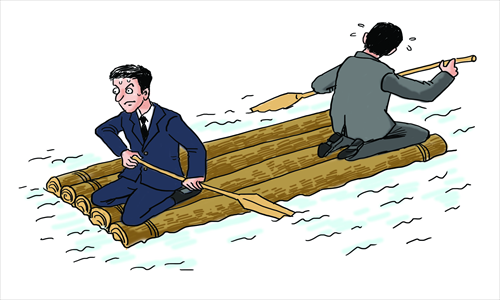ASEAN Summit should look beyond South China Sea issues

Phnom Penh, the Cambodian capital, will host the 21st ASEAN Summit from November 15 to 20. Cambodian Prime Minister Hun Sen said at an earlier ASEAN symposium that the summit "will promote the ASEAN integration process and strengthen the bloc's central role in the region's social architecture and economy." He also said Cambodia "would like to encourage the group's members and development partners to further strengthen cooperation, toward the establishment of an ASEAN Economic Community by 2015," a framework for liberalizing and facilitating cross-border capital flows.
The ASEAN Summit has long contributed greatly to the social and economic development of ASEAN members. The first summit in 1976 promoted these aims. The next year, an agreement to expand regional economic cooperation was reached. In 1992, ASEAN members signed the Framework Agreements on Enhancing ASEAN Economic Cooperation.
In the 21st century, cooperation among ASEAN members has entered a new stage, with the aim of setting up an ASEAN Community and the creation of the ASEAN Charter.
With the joint efforts of ASEAN members, the construction of an ASEAN Community has been pushed forward step by step. Despite the international and regional financial crisis of the past few years since its establishment, ASEAN and its members have managed to overcome difficulties. It is believed that its aim will be realized under the help of the forthcoming summit.
However in recent years, there have been different voices emerging during ASEAN's promotion of an ASEAN Community. Some members try to take advantage of the organization's overall interests to seek their own goals by using the South China Sea issue as leverage.
At the 45th ASEAN Foreign Ministers' Meeting in Cambodia this July, the Philippines strongly pushed to include the Huangyan Island dispute in the joint communiqué, an idea which was rejected by other members. This resulted in no issuance of a joint communiqué, something unprecedented in ASEAN's history.
Although ASEAN issued Six-Point Principles on the South China Sea, thanks to the reconciliation efforts of Indonesia, people are wondering whether the South China Sea issue will affect the integration process. As the 21st ASEAN Summit draws close, there are fears of rivalry between countries involved in the South China Sea disputes.
The disputes over the South China Sea have nothing to do with the ASEAN Summit and ASEAN's own development. In the past years, integration has developed smoothly and not been affected by the South China Sea issue. It is due to the evolution of the geopolitical structure in East Asia and the South China Sea that the South China Sea and ASEAN are being deliberately linked to each other.
With the US' shift toward the Asia-Pacific region, the South China Sea issue could be used by the US to get involved into regional affairs. Since 2009, the US has accelerated the pace of its return to Asia. It has enhanced military deployment in the West Pacific and attached more attention to Asia-Pacific affairs. Its hopes of containing China by getting involved into the South China Sea disputes have become clear.
In August, the US State Department issued a statement concerning China's establishment of Sansha city and its associated garrison. It was the second US official statement about the South China Sea, and the first was made 17 years ago. The US is playing a more prominent role in the South China Sea.
At the same time, Vietnam and the Philippines have enhanced resource exploitation and tightened control in the South China Sea, and their frictions with China have grown. They are intensifying the disputes over the sovereignty of the Nansha Islands and administrative rights in the sea areas, which has made the South China Sea disputes more complicated.
Countries involved in the disputes, such as Vietnam and the Philippines, are wooing others to make the issue a multilateral and international one. Thanks to their efforts, ASEAN meetings, including the summit, have touched upon the South China Sea issue more and more.
Although Vietnam and the Philippines are pushing forward a Code of Conduct on the South China Sea with other forces also lending a hand to raise the South China Sea issue at the summit, they may not reach their goals. China holds an open attitude toward such a Code of Conduct and toward cooperation with ASEAN.
China and other ASEAN members are facing the joint task of developing the regional economy. They should enhance communication and cooperation to contribute to regional economic growth and recovery of world economy. ASEAN members can solve the South China Sea issue properly while promoting the integrity of the region and build mutual political trust with China so as to avoid any conflicts.
The author is president of the National Institute for South China Sea Studies. opinion@globaltimes.com.cn
More in Sepcial Coverage